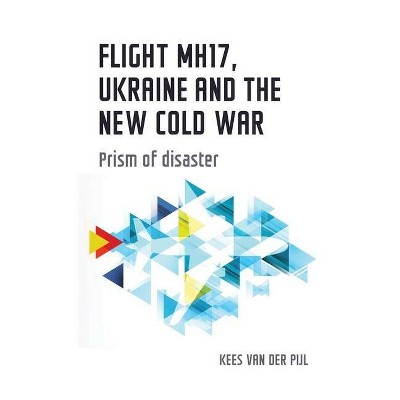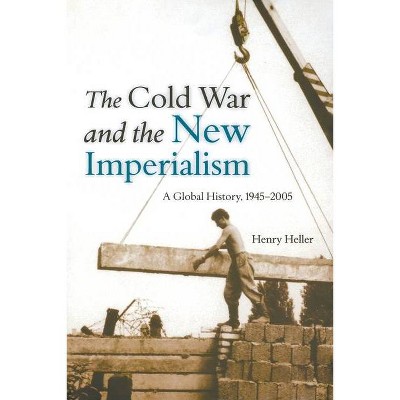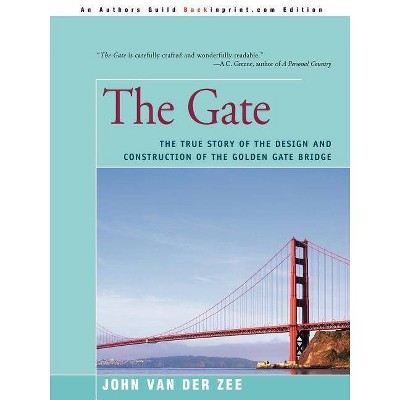Flight Mh17, Ukraine and the New Cold War - (Geopolitical Economy) by Kees Van Der Pijl (Paperback)

Similar Products
Products of same category from the store
AllProduct info
<p/><br></br><p><b> About the Book </b></p></br></br>A revealing investigation into the downing of Malaysian Airlines Flight MH17 amid the Ukrainian conflict emphasising the geopolitical and economic context of the West's standoff with Russia, the BRICS bloc, and the struggles over the EU's energy supply.<p/><br></br><p><b> Book Synopsis </b></p></br></br><p>On 17 July 2014 Malaysian Airlines Flight MH17 was shot down amid unrest in Ukraine, a conflict that led to a NATO-Russia standoff and the onset of a new period of East-West confrontation.</p><p>This is the first scholarly work on the Ukrainian unrest and the tragic downing of MH17. It offers an analysis that challenges the Western consensus surrounding these events, emphasising the geopolitical and economic context of the West's standoff with Russia, the BRICS bloc, and the struggles over the EU's energy supply.</p><p>Based on previously unpublished government and NATO documents as well as a wide array of sources this book offers an analysis of global political economy and contemporary debates about Russia and East-West relations.</p><p/><br></br><p><b> From the Back Cover </b></p></br></br>On 17 July 2014 Malaysian Airlines Flight MH17 was shot down amid unrest in Ukraine, a conflict that led to a NATO-Russia standoff and the onset of a new period of East-West confrontation. This is the first scholarly work on the Ukrainian unrest and the tragic downing of MH17. It offers an analysis that challenges the Western consensus surrounding these events, emphasising the geopolitical and economic context of the West's standoff with Russia, the BRICS bloc, and the struggles over the EU's energy supply. Based on previously unpublished government and NATO documents as well as a wide array of sources this book offers an analysis of global political economy and contemporary debates about Russia and East-West relations.<p/><br></br><p><b> Review Quotes </b></p></br></br><br>'Based on wide-ranging meticulous research, van der Pijl utilises the case of the downing of MH17 as a prism to refract the political corruption of state-directed oligarchic capitalism in Ukraine coupled to the self-interest of a neo-liberal driven European Union. He offers a masterly analysis of the complex domestic personal relationships and class forces involved in the breakup of Ukraine and the wider Soviet bloc, and concurrently the clash by foreign interests for material assets. The discussion of the downing of MH17 is based on a wide range of sources and provides the best available case study of the topic. Van der Pijl's research raises controversial conclusions both about the validity of the process, the conclusions of the investigation of the crash and the wider motivations of the principal interests. This is a book which can be recommended to students of contemporary capitalism, of the transformation of the socialist block as well as to those concerned with contemporary international affairs. It builds a convincing case of instances of collusion, misrepresentation, 'fake news' and lying underpinning the actions and policies of Ukrainian leaders and Western interests. There is a chilling message in the book - the propensity to resort to force and military action - which should worry all citizens. This is a book which deserves to be widely read and its uncomfortable conclusions will be intensely debated by students.' David Lane, Fellow of the Academy of Social Sciences and Emeritus Fellow of Emmanuel College, Cambridge University 'Providing an essential counterpoint to the dominant post-Soviet narrative - that neoliberal capitalism brings democracy and prosperity - Kees van der Pijl blasts his way through decades of western myth-making to expose the brutal reality: that America's drive for global domination continues. And as the US falters economically it uses its raw military power to enforce an unchallenged unipolar world - its goal is neoliberal global governance backed by full spectrum military dominance and US nuclear primacy. But powerful political and economic forces are working to resist this never-ending US expansionism. Van der Pijl reveals the latest stages in this global struggle, this new cold war, in a forensic and captivating account, centred on the conflict in Ukraine - a microcosm of the current global crisis.' Kate Hudson, General Secretary of the Campaign for Nuclear Disarmament (CND), Media Officer of Left Unity and Visiting Research Fellow at London South Bank University 'This book successfully combines top-down and bottom-up approaches to the evolution of EU-US confrontation with Russia from the key year 2008, when Russia turned from hopeful member of the US-led global alliance to a "contender," challenging that hegemony in what is now a new Cold War. Van der Pijl applies penetrating analysis from political economy, showing how the latest crises of global capitalism play out in the fault lines of Ukraine. As for the bottom-up narratives, we find here clear delineation of the intersection of oligarchs and political fractions dating from Ukraine's independence to time present. The narrative on the ground slows to detailed accounting for every historic turn directly leading up to and following the coup d'etat of February 2014, providing the full context for the MH17 air catastrophe. Easily readable, but with full scholarly attributes of Notes, extensive bibliography and index.' Dr Gilbert Doctorow, Russia specialist and journalist 'A must for anyone studying the origins of the new Cold War. A profound analysis of the geopolitical context of the Ukrainian civil war. The book is well written and highly accessible. It contains a lot of material that did not find its way to the Western main-stream press. Van der Pijl shows how especially Western involvement transformed Ukrainian internal struggles into a conflict between NATO and Russia. The book is a valuable contribution to the debate about the recent history of Ukraine.' Hans van Zon, Professor Emeritus, Central and Eastern European Studies, University of Sunderland, author of <i>The Political Economy of Independent Ukraine</i> 'Kees van der Pijl has succeeded once again. Revisiting the downing of Flight MH17 in order to develop a macro-analysis of the contemporary global political economy, <i>Flight MH17, Ukraine and the new Cold War</i> is a magisterial work that demystifies the contemporary discussions on Russia and East-West relations. Rich in insight and information - bringing together history, political economy and geopolitics - it will certainly impact current debates on international politics.' Professor Leonardo César Souza Ramos, Pontifícia Universidade Católica de Minas Gerais, Belo Horizonte, Brazil 'The downing of flight MH17 on 17 July 2014 over Ukraine marks a rupture in post-Cold War international politics. In this meticulously detailed study, Kees Van der Pijl deftly and expertly places the tragedy in the larger context of the onset of a new period of East-West confrontation, while at the same time providing an expert analysis of the event itself. The book courageously stands against much conventional thinking, and thus provides a necessary corrective to stereotypes. This is essential reading for analysts and above all policy-makers.' Professor Richard Sakwa, Russian and European Politics, University of Kent, author of <i>Frontline Ukraine, </i>2016 'An incontrovertibly important book. Not an investigation into the MH17 catastrophe per se, but rather an explanation for the anti-Russia campaign that unfolded afterwards. Through the prism of the MH17 disaster, van der Pijl provides the broader historical context that led up to the tragedy, and how it continues to reverberate with us today. He argues that we should not view it as an isolated accident, but "place it in the context of a wider confrontation, the one pitting the liberal West against a loose contender bloc." . . . van der Pijl's neo-Marxist theoretical perspective, and willingness to use a case study as an illustration of broad global trends, is reminiscent of the classic writings of the late Gabriel Kolko. It is no exaggeration to say that this book is unlike any other currently available on the MH17 tragedy.' Professor Nicolai N. Petro, Politics, University of Rhode Island, editor of <i>Ukraine in Crisis, </i> 2017 'Numerous questions in connection with the MH17 disaster remained unanswered because they were not asked by Dutch officials and media. By sifting through circumstancial and ignored evidence, Kees van der Pijl gives us in this most up to date account probable and possible answers about this geopolitically momentous matter.' Karel van Wolferen, Emeritus Professor of Comparative Political and Economic Institutions, University of Amsterdam 'Professor Kees van der Pijl's MH17, Ukraine and the New Cold War will be long regarded as a landmark in both geopolitics and global political economy. He has convincingly demonstrated that we are now in a new Cold War, after the global financial crisis of 2007-08, starting with the collapse of Lehman Brothers in September 2007. ...Washington has continually interfered in the affairs of a weakened USSR, an interference that became blatant in the case of the successor states of the Soviet Union, especially after the promulgation of the Wolfowitz Doctrine that the USA must in future remain the sole superpower with overwhelming economic and military superiority, and all instruments for achieving for achieving it, including unprovoked wars were legitimate means for attaining that end. I expect this book to be a must-read for all students of international relations and global political economy.' Amiya Kumar Bagchi, Emeritus Professor at the Institute of Development Studies, Kolkata and Adjunct Professor, Monash University 'Kees van der Pijl is both an eagle and a truffle hunter. Like a truffle hunter he reconstructs in great detail the downing on 17 July 2014 of Malaysia Airlines Flight 17 over eastern Ukraine, killing 296 passengers and crew. Like an eagle he situates this catastrophe in the much broader picture of the Soviet Union's disintegration and the concurrent NATO and EU expansion. Van der Pijl's well-written study does not give a definitive answer to the question "who did it?", but helps us immensely to understand the context of this tragic event.' Dr Marcel van der Linden, International Institute of Social History, Professor Emeritus, University of Amsterdam<br><p/><br></br><p><b> About the Author </b></p></br></br>Kees van der Pijl is fellow of the Centre for Global Political Economy and professor emeritus in the School of Global Studies at the University of Sussex. He is best known for his writings on transnational class formation, notably <i>The Making of an Atlantic Ruling Class</i> (1984, new edition 2012); <i>Transnational Classes and International Relations</i> (1998); <i>Global Rivalries from the Cold War to Iraq</i> (2006), and others. From 2006 to 2009 he held a Leverhulme Major Research Fellowship. In 2008 he was awarded the Deutscher Memorial Prize for <i>Nomads, Empires, States</i> (2007), the first volume of a trilogy entitled <i>Modes of Foreign Relations and Political Economy</i>, of which vols. II and III appeared in 2010 and 2014.
Price History
Price Archive shows prices from various stores, lets you see history and find the cheapest. There is no actual sale on the website. For all support, inquiry and suggestion messagescommunication@pricearchive.us



















